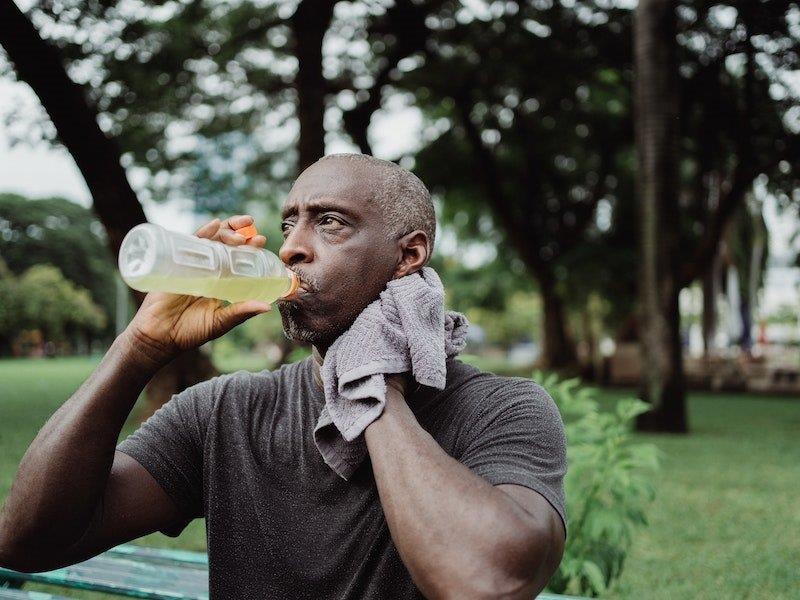We’ve been there before. You’re in the middle of an intense workout, and suddenly you find yourself yawning.
Normally when we think of yawning, we think of being tired or sleepy. So why do we often find ourselves yawning after a heavy set at the gym?
Below, we’ll share all the findings researchers have identified causing us to yawn during workouts.

It Keeps Your Lungs Wet
Yawning actually involves quite a lot of muscles. Between your chest, throat, diaphragm, and mouth, there are several motions that go into one simple yawn.
When this happens, your lungs take in lots of air at once. It’s believed that yawning helps spread surfactant (moisture in your lungs) throughout the surface of your lungs. It then gets on your alveoli, which are the tiny sacs responsible for taking in oxygen.
Though yawning itself isn’t a sign your body needs more oxygen (this has been debunked a few times), it can still keep your lungs lubricated and working nicely.
Since you are likely breathing pretty hard during a workout, your lungs may get drier, causing your body to yawn in response.
You’re on New Medication
Think about the times you work out and the times you take any prescribed medications. If you’re taking your meds around the same time as your workout, this could be the source of your yawning.
In particular, lots of different SSRIs (antidepressants) can cause yawning as a side effect. If you’ve recently started taking a new medication around your workout time and have noticed an increase in yawning, bring it up with your doctor.
It Cools Your Brain
When we work out, our body temperature increases. Our blood is pumping, and we may begin to sweat. Some research has shown that when the brain’s temperature starts to rise, the body yawns to try to cool it down.
A study in the International Journal of Applied and Basic Medical Research showed that cooling the brain with traditional methods like ice packs and cool water reduced yawning compared to those who didn’t do this.
If you notice yourself yawning as you heat up during particularly intense workouts, try to use water, rags, or ice packs to cool down and see if that helps.
It Brings Blood to Your Brain
Getting your blood pumping can be a great thing for your body, but sometimes your brain gets a little jealous. With your blood rushing to your muscles as you work out, your brain may end up with less blood as you exercise.
Yawning is really one big way for our bodies to wake us back up. If we have less blood in our brain, we may start to feel a little drowsy. To bring blood back up to the brain and wake us up, the muscles in our jaw and face stretch as we yawn. This can keep you alert, especially if you’re already tired before you’ve even begun.

It Reduces Stress and Pressure
Think about the feeling of stretching your muscles when you first wake in the morning. You tense up really tight, then release – and then your muscles feel much more relaxed than they were before.
Yawning is similar. You tense up the muscles in your face and throat, and then you’re more relaxed. Some believe that yawning happens as a stress response, to help reduce tension in your head and neck. Since working out can put a strain on your muscles, it’s definitely possible that this is a cause of workout yawns.
It can also help reduce pressure in your skull. If you’ve ever popped your ears, you know how moving your jaw can help with that. Yawning is your body’s way of regulating itself in more ways than one. And during a workout, it’s working even harder to keep itself regulated.
When to Be Concerned
If your yawning is genuinely getting in the way of your workouts, or if your yawning begins to be chronic even outside the gym, you may want to see a doctor. Chronic yawning can be a result of many different issues, such as sleep apnea or narcolepsy, that should be checked out by a professional.
For those who just yawn occasionally between HIIT workouts or heavy reps, you shouldn’t have much to worry about. Lean into the yawn and enjoy the release of tension as you continue your workout.

Tips to Stop Yawning During Workouts
Though you may not be able to stop your yawning entirely, there are a few ways you can try to reduce your yawns.
As mentioned before, most yawning is your body’s attempt to regulate its temperature. Try to cool off in other ways to reduce your yawns. You can do this by using ice packs, cool towels, wiping your forehead, using a hand fan, and staying hydrated.
You should also try to make sure you’re well-rested before hitting the gym. The sleepier you are, the more likely you’ll yawn with exercise on top of your exhaustion.
Finally, focusing on your breathing can be a final way to reduce your yawns. Deep breaths in and out through your nose tend to reduce yawns according to a study in 2007.
Final Thoughts
Though yawning at the gym can feel a little strange, it’s actually quite normal. It’s your body’s way of telling you to cool down, relax, and take a few more deep breaths.
The next time you have an intense workout planned, bring some cool towels and water to keep your body temperature down and reduce yawning. Staying hydrated with cool water can help too.
To help reduce your yawns and help your body come down after an intense workout, take a few minutes to look at our top cool-down exercises.
